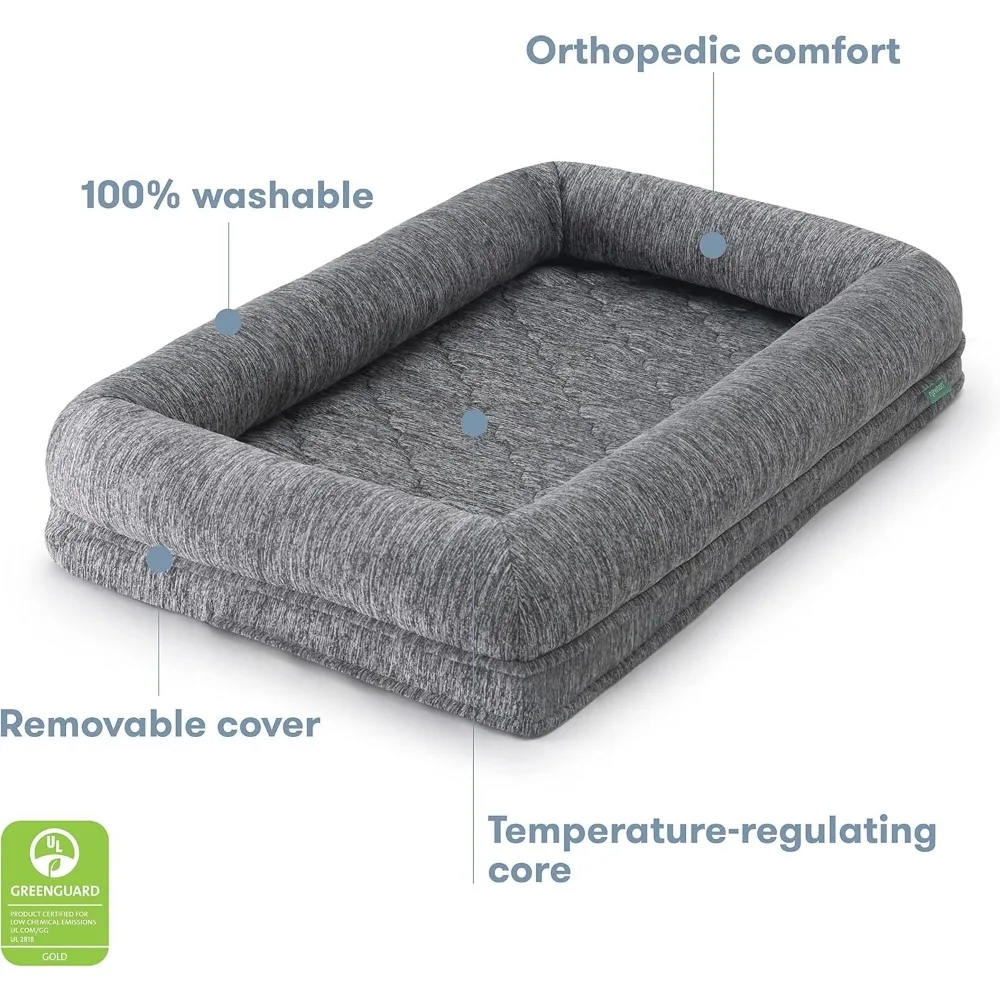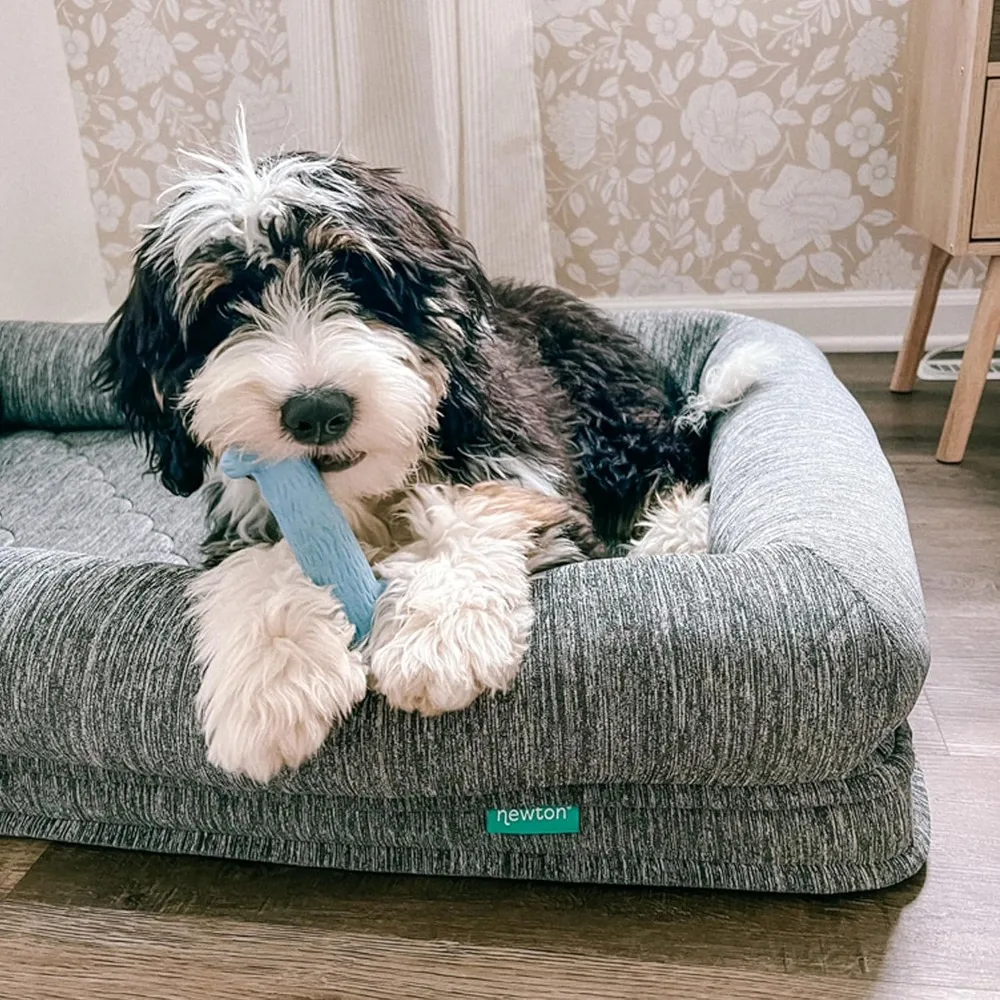Introduction
Having a pet can bring joy, but it can also lead to some unexpected challenges. One of these challenges is why does my dog pee on his bed. This behavior can be baffling and frustrating. It may seem like a simple issue, but many factors can contribute to this behavior. In this article, we will explore the reasons behind this issue and provide practical solutions for dealing with it.

Physical Health Issues
Urinary Tract Infections
Urinary tract infections (UTIs) can cause dogs to urinate inappropriately. This condition can lead to discomfort and frequent urination. If your dog is suddenly peeing on his bed, a UTI might be the cause.
When a dog has a UTI, he may feel an urgent need to urinate. As a result, he might not make it outside in time. If your dog associates his bed with a secure and comfortable space, he may choose to relieve himself there. Other symptoms of a UTI include straining to urinate, blood in the urine, and excessive licking of the genital area.
Other Medical Conditions
Various other medical conditions can also cause inappropriate urination. These conditions may include diabetes, kidney disease, or bladder stones. These issues can lead to increased thirst and urination. If your dog is drinking more water and urinating frequently, a medical issue might be at play.
Always consult your veterinarian if you notice sudden changes in your dog’s bathroom habits. A professional can help you determine if a physical health issue is causing the problem.
Behavioral Reasons
Anxiety and Stress
Dogs are sensitive creatures. They can experience anxiety and stress, just like humans. If your dog feels insecure, he may resort to peeing on his bed to cope. Changes in the environment can trigger feelings of anxiety.
For example, moving to a new house or the arrival of a new family member can unsettle your dog. Additionally, loud noises, such as thunder or fireworks, may cause panic. In these situations, your dog might seek comfort in his bed and feel the need to mark it with his scent. This behavior can become habitual over time.

Lack of Training
Some dogs may not fully understand where it’s acceptable to urinate. If a dog is not potty trained properly, he might not know that his bed is not an appropriate place. This lack of training can lead to confusion and mistakes.
For instance, puppies typically require consistent training to learn where to do their business. If you adopted an older dog, he may have been poorly trained in his previous home. Therefore, he might need extra guidance to learn the right behaviors.
Territorial Marking
Instinctual Behavior
Dogs are territorial animals. They have strong instincts to mark their territory by leaving their scent. If your dog feels threatened by another pet or human, he may pee on his bed to claim it as his own. This behavior helps him feel more secure in his environment.
When dogs feel their territory is being invaded, they might respond with marking behaviors. This instinctive response can lead them to pee on items that are important to them, like their bed.
Changes in Environment
Any changes in the home can trigger territorial behavior. Bringing in a new dog, cat, or even a visiting friend can upset your dog. If he feels his territory is challenged, he may respond by marking his bed. To prevent this, provide a safe space for your dog. A quiet area away from any new pets or stressors can help.
Reducing the Problem
Establish a Routine
Establishing a routine can be beneficial for your dog. By taking him out on a regular schedule, you can help him learn when and where to urinate. Consistent timing can make a significant difference in his behavior.
Take your dog out first thing in the morning and before bedtime. Also, try to take him out after meals or playtime. These moments often lead to a full bladder. Consistency gives your dog the opportunity to succeed outside.
Reinforce Good Behavior
When your dog goes outside to relieve himself, be sure to praise him. Positive reinforcement helps him associate going outside with rewards. Offering treats or affection for doing his business outside encourages him to continue this practice.
If your dog does pee on his bed, do not punish him. Instead, try to understand why it happened. Punishing after the fact can confuse him and create more anxiety.
Create a Comforting Environment
Reducing anxiety in your dog can help prevent him from peeing on his bed. Create a comfortable environment for your pet. This space should be quiet and free from disturbances.
Consider providing a cozy blanket or toy to help him feel secure. If your dog is anxious during loud noises, try using calming products. Anxiety wraps or pheromone diffusers can help reduce his stress levels.
Cleaning Up
Use the Right Cleaning Products
When your dog has an accident, cleaning the area properly is crucial. Use products specifically designed to eliminate pet stains and odors. Regular household cleaners may not remove the scent, leading your dog to mark the same area again.
Look for enzymatic cleaners that can break down the odor. Thoroughly clean the bedding and any other affected areas. This practice helps teach your dog that it is not acceptable to use those areas.
Creating a New Space
If your dog continues to pee on his bed, consider providing a new space. Sometimes the original bed may become associated with negative experiences. A new bed might distract him from his previous habits.
Choose a bed that is easy to clean. Consider a waterproof cover or material that can withstand accidents. Create a fresh start for your dog and help him unlearn any bad behaviors associated with his old bed.
Consulting Professionals
When to Seek Help
If you cannot determine the cause of your dog’s behavior, it might be time to consult a professional. A veterinarian can rule out medical issues. If physical problems are not to blame, a professional dog trainer or behaviorist can offer guidance.
They can assess your dog’s behavior and help you develop a plan. Working with a professional can provide insights that may not have occurred to you. They can also teach you effective training methods tailored to your dog’s needs.
Training Programs
Consider signing your dog up for obedience classes. These classes can help with both training and socialization. They offer the opportunity for you and your dog to learn together. Engaging in a structured setting can strengthen the bond between you and your pet.
A well-trained dog is less likely to display problematic behaviors. Regular lessons can reinforce good habits and reduce any anxiety your dog might have.

Conclusion
Understanding why your dog pees on his bed involves looking at both physical and behavioral factors. From health issues to anxiety and training gaps, many reasons may contribute to this behavior. Identifying the cause is the first step in addressing the problem.
By implementing training routines, creating a comforting environment, and consulting professionals, you can help your dog overcome this challenge. It takes time and patience, but a consistent approach will yield lasting results. Your relationship with your dog will grow stronger as you work together to resolve the issue.